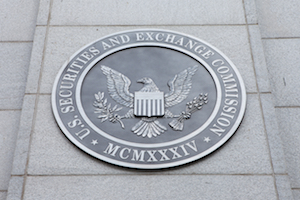 Noting that its guidance on the issue has not been updated in more than 40 years, the SEC voted unanimously on Dec. 22 to modernize rules governing investment adviser advertisements and solicitor compensation under the Investment Advisers Act.
Noting that its guidance on the issue has not been updated in more than 40 years, the SEC voted unanimously on Dec. 22 to modernize rules governing investment adviser advertisements and solicitor compensation under the Investment Advisers Act.
To “comprehensively and efficiently” regulate investment advisers’ marketing communications, the amendments create a single rule that replaces the current advertising and cash solicitation rules, Rule 206(4)-1 and Rule 206(4)-3, respectively.
According to the SEC, the current advertising rule’s broadly drawn limitations is replaced with principles-based provisions to accommodate the continual evolution and interplay of technology and advice, and includes tailored requirements for certain types of advertisements.
For example, the rule will require advisers to standardize certain parts of a performance presentation to help investors evaluate and compare investment opportunities. In addition, advertisements that include third-party ratings will be permitted, as long as the adviser provides disclosures and satisfies certain criteria pertaining to the preparation of the rating to “prevent them from being misleading.”
The rule also will permit the use of testimonials and endorsements, which include traditional referral and solicitation activity, subject to certain conditions. For example, advertisements must “clearly and prominently” disclose whether the person giving the testimonial or endorsement is a client and whether the promoter is compensated.
“The marketing rule reflects important updates to the traditional advertising and solicitation regimes, which have not been amended for decades, despite our evolving financial markets and technology,” Chairman Jay Clayton stated. “This comprehensive framework for regulating advisers’ marketing communications recognizes the increasing use of electronic media and mobile communications and will serve to improve the quality of information available to investors.”
While Commissioners Allison Herren Lee and Caroline Crenshaw supported the rule, they expressed displeasure that the final rule dropped a proposal to require advisers to review advertisements for compliance purposes before using those advertisements. “The decision on this aspect of the rule is a missed opportunity to promote better compliance in this critical area, and will likely place advertisements on the list of examination and enforcement priorities for years to come,” they noted in a joint statement.
The Marketing Rule
According to a fact sheet, the amended definition of “advertisement” contains two prongs: one that captures communications typically covered by the advertising rule and another that governs solicitation activities previously covered by the cash solicitation rule.
First, the definition includes any direct or indirect communication an investment adviser makes that:
- offers the investment adviser’s investment advisory services regarding securities to prospective clients or private fund investors; or
- offers new investment advisory services regarding securities to current clients or private fund investors.
The first prong of the definition excludes most one-on-one communications and contains certain other exclusions.
Second, the definition generally includes any endorsement or testimonial for which an adviser provides cash and non-cash compensation directly or indirectly, such as directed brokerage, awards or other prizes, and reduced advisory fees.
Among the advertising practices that will be prohibited under the marketing rule include:
- making an untrue statement of a material fact, or omitting a material fact necessary to make the statement made not misleading;
- including information that would reasonably be likely to cause an untrue or misleading implication or inference to be drawn concerning a material fact relating to the adviser;
- discussing any potential benefits without providing fair and balanced treatment of any associated material risks or limitations; or
- including or excluding performance results, or presenting performance time periods, in a manner that is not fair and balanced.
Performance Information
In general, the rule prohibits including in any advertisement:
- gross performance, unless the advertisement also presents net performance;
- any performance results, unless they are provided for specific time periods in most circumstances;
- any statement that the Commission has approved or reviewed any calculation or presentation of performance results;
- performance results from fewer than all portfolios with substantially similar investment policies, objectives, and strategies as those being offered in the advertisement, with limited exceptions;
- performance results of a subset of investments extracted from a portfolio, unless the advertisement provides, or offers to provide promptly, the performance results of the total portfolio;
- hypothetical performance, unless the adviser implements policies and procedures designed to ensure that the performance is relevant to the likely financial situation and investment objectives of the intended audience; and
- predecessor performance, unless there is appropriate similarity regarding the personnel and accounts at the predecessor adviser and the personnel and accounts at the advertising adviser.
Books and Records Rule and Form ADV
The Commission has also made related amendments to Form ADV, the investment adviser registration form, and Rule 204-2, the books and records rule. The staff of the Division of Investment Management also expects to withdraw no-action letters and other guidance addressing the application of the advertising and cash solicitation rules. A list of the letters will be available on SEC.gov.
Transition Period
The marketing rule, amended books and records rule, and Form ADV amendments will be effective 60 days after publication in the Federal Register. The Commission has adopted a compliance date that is 18 months after the effective date to give advisers a transition period to comply with the amendments.

